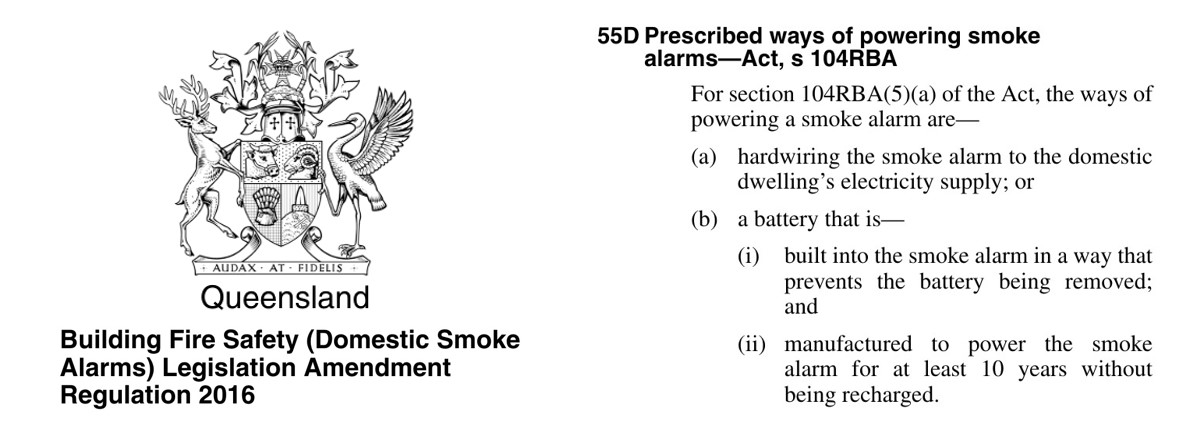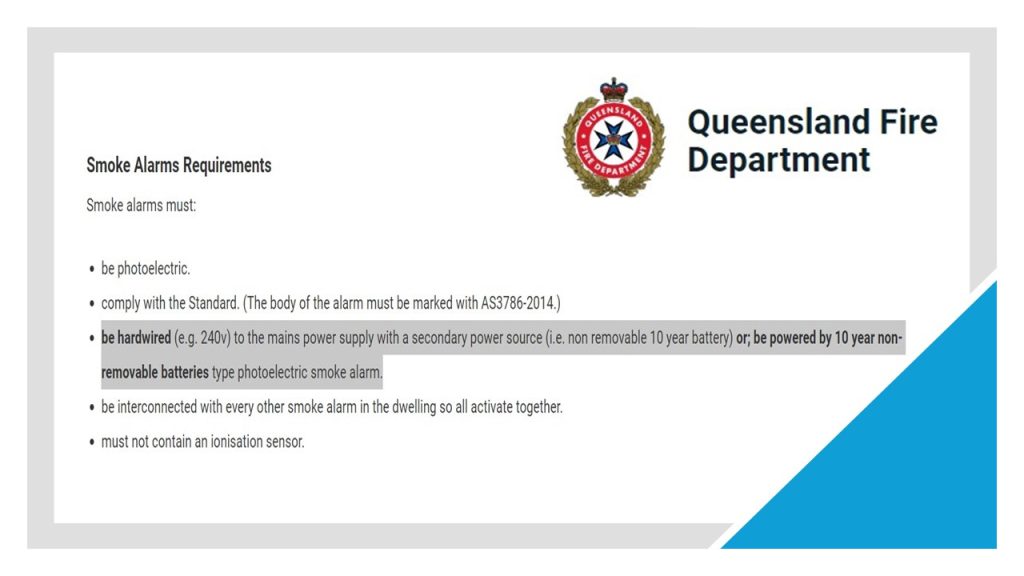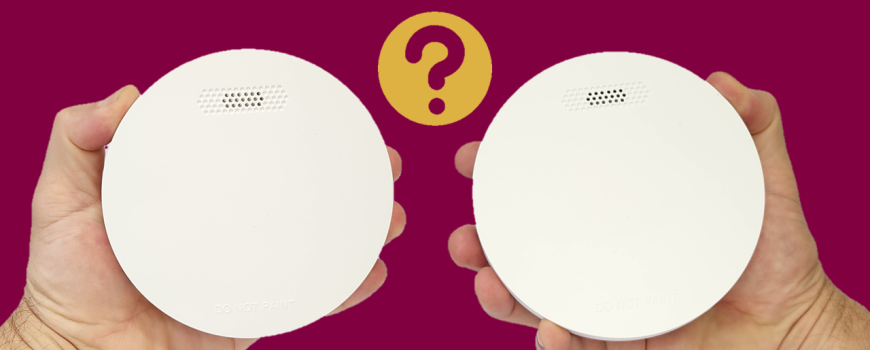Smoke alarm regulations in Queensland can be confusing, especially with the staggered implementation of new laws. Many homeowners are unsure whether they need a 240V smoke alarm or if they can opt for a wireless, battery-powered alternative. This article clarifies when each type of smoke alarm is required and ensures you remain compliant with Queensland’s fire safety laws.
Understanding Queensland’s Smoke Alarm Laws
Queensland has some of the strictest smoke alarm regulations in Australia. The changes introduced under the Building Fire Safety (Domestic Smoke Alarms) Legislation Amendment Regulation 2016 are designed to improve home fire safety and reduce fatalities caused by house fires. As part of these changes, all homes sold or leased must comply with the new laws. By 2027 these laws will be extended to all homes in QLD, irrespective of the situation.
The legislation outlines where smoke alarms must be installed and how they should be powered. Homeowners and landlords must ensure compliance with these laws, or they could face penalties. We encourage you to view and read the legislation for yourself too – direct links to all official government sources are included at the bottom of this article for your reference.
Can I Install Wireless 10-year Battery Powered
Smoke Alarms In QLD?
Yes! It is perfectly legal to install wireless smoke alarms with a sealed 10-year lithium battery in Queensland, provided you are not engaging in any of the following three activities:
- Constructing a new home
- Performing a substantial renovation
- Replacing an existing 240V smoke alarm
Queensland’s Building Fire Safety (Domestic Smoke Alarms) Legislation Amendment Regulation 2016, states that both 240V hardwired smoke alarms and wireless 10-year battery-powered smoke alarms are allowed – see the excerpt below;

The Queensland Fire Department website states that 10-year battery powered smoke alarms are acceptable, provided the three scenarios previously mentioned above are not being performed.

240V smoke alarms vs wireless smoke alarms – QLD Fire Department website
Advantages Of 10-Year Battery Powered Smoke Alarms
Wireless smoke alarms powered by a sealed 10-year lithium battery offer several benefits:
- Easy DIY installation – No need for an electrician, saving time and money.
- No battery replacements – The battery lasts for the entire 10-year lifespan of the alarm.
- No annoying low-battery chirps – The alarm is simply replaced after 10 years.
- Ideal for homes where wiring is difficult – Perfect for properties with solid concrete ceilings or no roof cavity.
- Interconnected for enhanced safety – Wireless smoke alarms can communicate with each other using radio frequency, ensuring that if one alarm is triggered, all alarms in the house will sound.
- Affordable and accessible – Wireless smoke alarms are typically cheaper to install compared to hardwired alternatives.
QLD Fire Department talks DIY installing wireless 10-year battery powered smoke alarms
Where Should Wireless Smoke Alarms Be Installed?
Queensland legislation specifies that smoke alarms must be installed in:
- Each bedroom
- Hallways connecting bedrooms to the rest of the house
- At least one on each level of a multi-storey home
For the best protection, alarms should be interconnected, so if one goes off, they all do. Wireless models make this process much simpler.
Do all Queensland Homes Need a 240V Smoke Alarm by 2027?
No, not all homes in Queensland require 240V smoke alarms by 2027. While some houses must have hardwired 240V smoke alarms, many homes can legally use wireless 10-year battery-powered smoke alarms and remain fully compliant.
The Queensland government phased in these changes to improve home safety, but they also provided flexibility in the types of alarms that can be used. Homeowners need to be aware of their specific situation and choose the right smoke alarm type accordingly.
When Is a 240V Smoke Alarm Legally Required in Queensland?
There are only three situations where Queensland law mandates the installation of a 240V hardwired smoke alarm:
1) Constructing a New Home
If you are building a new home in Queensland, you must install hardwired 240V smoke alarms as part of the building approval process. Queensland’s Building Regulation 2021 states that smoke alarms in new homes must be hardwired to the domestic electricity supply.
This ensures that new homes have a stable and reliable power source for their smoke alarms, providing long-term safety. Additionally, these alarms must be interconnected, either via wiring or radio frequency.
2) Performing a Substantial Renovation
Under Queensland’s Fire Services Act 1990, hardwired smoke alarms must be installed when conducting significant renovations to a domestic dwelling.
A substantial renovation typically refers to major structural work that requires building approval. If your renovation meets this threshold, your smoke alarm system must be upgraded to include hardwired 240V smoke alarms.
3) Replacing an Existing 240V Smoke Alarm
If your home already has a 240V smoke alarm and you are replacing it, the new smoke alarm must also be hardwired to the electricity supply, as required by the Fire Services Act 1990.
This ensures that homes with an existing 240V smoke alarm maintain their level of protection and comply with Queensland’s safety standards. You cannot replace a hardwired smoke alarm with a battery-powered one unless the property falls outside the mandatory wiring requirements.
Outside of the 3 scenarios described above, it is legal and perfectly acceptable in QLD to install wireless photoelectric interconnected smoke alarms which are
powered by a non-removeable 10-year battery.
Wireless vs 240V Smoke Alarms: Which One Should You Choose?
If you are building a new home, conducting major renovations, or replacing an existing hardwired unit, you must install a 240V smoke alarm. However, if none of these situations apply, wireless 10-year battery-powered smoke alarms are a legal and effective choice.
Factors to Consider When Choosing a Smoke Alarm:
- Compliance – Ensure the alarm you choose meets Australian Standard 3786:2014.
- Ease of Installation – Wireless alarms are easy to install yourself, while 240V alarms require an electrician.
- Power Supply – 240V alarms rely on mains electricity with a backup battery, while wireless alarms run entirely on a sealed 10-year lithium battery.
- Interconnectivity – Both types can be interconnected, but wireless models provide a more flexible installation option.
- Cost – 240V smoke alarms require professional installation, which increases the overall cost.
Conclusion – Wireless vs 240V Smoke Alarms
Unless you are constructing a new home, performing a substantial renovation, or replacing an existing 240V smoke alarm, you have the flexibility to install wireless, interconnected photoelectric smoke alarms powered by a 10-year sealed battery. These alarms meet Queensland’s compliance requirements while offering a cost-effective, hassle-free solution for homeowners.
By staying informed and choosing the right type of smoke alarm, you can protect your home and family while ensuring legal compliance.
Want to do some further reading? Links to all official sources in this article are provided below.
You may also want to check out our other helpful blog post ‘What are the new QLD smoke alarm laws?‘

Building Fire Safety (Domestic Smoke Alarms) Legislation Amendment Regulation 2016
States that both 240V hardwired smoke alarms and 10-year battery powered smoke alarms are allowed in domestic QLD dwellings.
States that when constructing a new home in QLD, the smoke alarms must be hardwired to the domestic dwelling’s electricity supply.
States hardwired smoke alarms must be installed when performing a substantial renovation or replacing an existing hardwired smoke alarm.
QLD Fire Department website – 2027 Smoke Alarm Legislation Fact Sheet
States that smoke alarms must be either hardwired or powered by a non-removable 10 year battery, or a combination of both may be allowed.
States that existing hardwired smoke alarms that need replacement must be replaced with a hardwired smoke alarm.

Want to know more? Watch our ZEN Smoke Alarm YouTube channel or call us on 0478 596 402 today
We love talking smoke alarms!
ZEN Interconnected Smoke Alarms
New Farm, QLD, 4005

